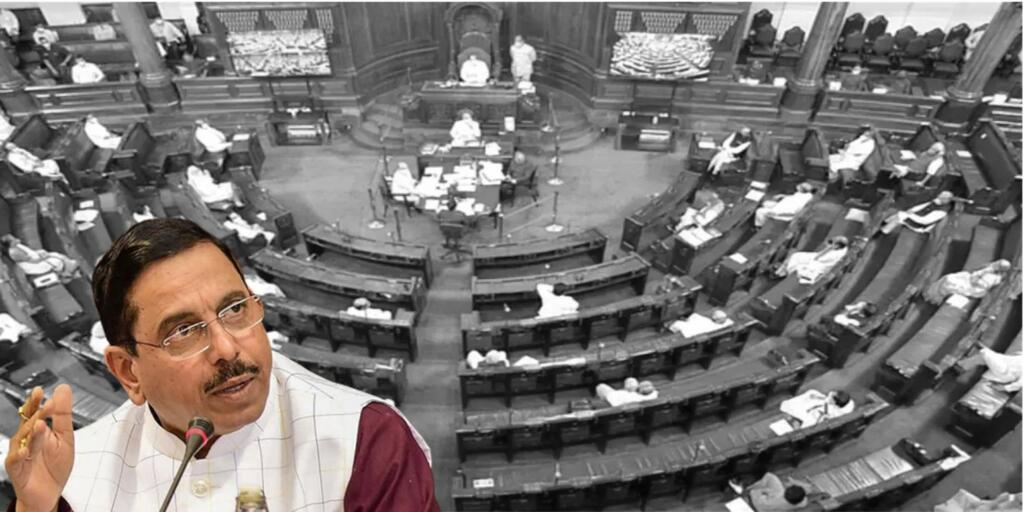End of Madam Sir culture: India has been a civilisational state, however with multiple Christian and Islamic invasions, we Indians gradually gave up on our own cultural inheritance and started adopting the one imposed on us. Although we are celebrating 75 years of India’s independence, we still continue to carry the heavy weight of cultural imposition in many forms, sexism or misogyny is one such example. Well, the Parliament of India has made a landmark decision in this direction and it must travel to the lowest of offices of India and to the society as well.
Chaturvedi requests for a small change for a big movement
Priyanka Chaturvedi, the Shiv Sena Rajya Sabha MP had written a letter addressing the Parliamentary Affairs Minister Prahlad Joshi on September 8, in which she had requested a change in the use of gendered phrases such as ‘No Sir’. Chaturvedi had urged Joshi to issue directions to address the parliamentarians as per their gender identity. In her letter, she had mentioned that terms like ‘No Sir’ is often used as standard responses during the sessions calling it “institutional gender mainstreaming”.
Also Read-Happy International Men’s Day because Men need to be celebrated too
Rajya Sabha drops ‘Sir Culture’ for ladies
The Rajya Sabha in response to Chaturvedi’s concerns has recognised the need to bring inclusivity into the sessions by addressing everyone in gender neutral terms. Responding in agreement, the Rajya Sabha Secretariat said, “The ministries will be informed to furnish gender-neutral replies to the Parliamentary questions from the next session of Rajya Sabha onwards.” As per a report by the Indian Express, the secretariat also conveyed that as per the rules of official procedure and conduct, all the proceedings of the House would be addressed to the Chair, and responses would be framed to the “chairperson”.
Chaturvedi reacting to the change said that, “Although this may seem like a small change, but it will go a long way in giving women their due representation in the parliamentary process.”
The culture of ‘Madam Sir’ and ‘Sahebs’
While for many the news must have seemed irrelevant but this is indeed a big decision by the respective office of the Parliament of India. As till date, be it women parliamentarians, high rank female police officers, DMs or SPs, at some point of time or for entire career they have heard terms like ‘Madam Sir’, ‘Saheb’ or simply just ‘Sir’. The most appropriate example to it was when Nirmala Sitharaman was handed over the charge of Defence Ministry of India. Reports were published back then, how soldiers seemed confused over how to address India’s first full time woman defence minister. Sitharaman was addressed with different connotations, the most common being Sir. Jawans even asked how they should address the minister, to which Sitharaman answered, “You can just call me Raksha Mantri please.” The reason that can be cited here is an army officer’s wife is called memsaab by troops and sir is used as a generic term that covers women officers too. This clearly elaborates how female women officers are addressed with ‘Sir’.
Some real incidents that stand in deposition for widespread ‘Sexism’
In a recent incident, Justice Rekha Palli had come down heavily on a lawyer during a hearing in the Delhi High Court, as the lawyer kept addressing the justice as ‘sir’. Promptly, responding to the lawyer, the justice said, “I am not ‘sir’. I hope you can make that out. ” Next, the lawyer replied, “Sorry, it’s because of the chair you are sitting in,” Justice Palli aggressively shot back, “Then that’s even worse! If after all this time you think that the chair is for sirs. If the younger members don’t stop differentiating, then what hope do we have for the future?”
Renuka Mishra, DG, SIT, UP Police shared similar instances with The Times of India, she mentioned how she was addressed as sir, saab, madam sir. She also mentioned how her subordinates called her devi. She said, “kabhi devi, kabhi maa, kabhi behen bana lete hain,” emphasising that it never happens with the male officers. They are not called bhaiya or bhaisaab by any junior.
Deepika Suri, working at IG Narmadapuram, MP Police told Times of India that she took the word ‘sir’ in a gender-neutral fashion mentioning that, “agar senior hain to sir hain.” She says that IG madam means wife of IG also. But when it is IG sahab then it is IG sahab, referring to the post.
Bihar’s first female IPS officer Manjari Jaruhar has also penned a book with the title Madam Sir, that elaborates about her struggle as a lady police officer.
What is madam sir?
From Judiciary, to Police, to IAS, to the Parliament of India. The practice of addressing women as sir, madam sir, or sahib is so common that it has never been pointed out.
The way ahead- HOPE
The ones who feel awkward at the initial stage slowly get habituated and accept that this is the norm in the outside world. Many point out that a male officer must have never been addressed as ‘Madam’ pointing at the deep-rooted sexism and social conditioning. Many also believe that they are facing this as they are the first to break the glass ceiling and step into a male dominated profession, and hope that it will change with time as more and more women will be in the workforce. Well, the recent decision by the Parliament office should be taken on a positive note.
Support TFI:
Support us to strengthen the ‘Right’ ideology of cultural nationalism by purchasing the best quality garments from TFI-STORE.COM
